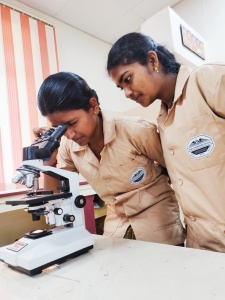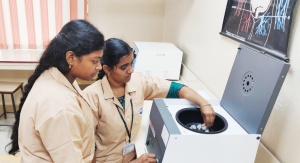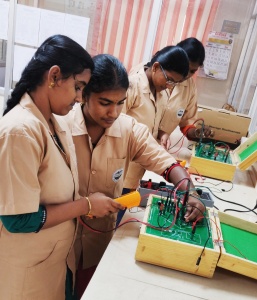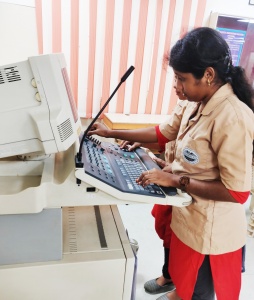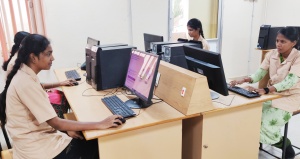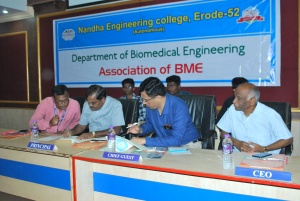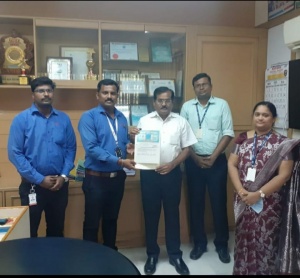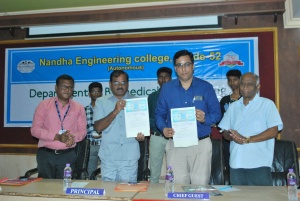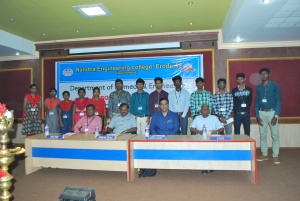Biomedical Engineering is started in the academic year 2018-19 with clear vision to promote the challenges in the current medical field through education and research that bridges the gap between Engineering, Biology and Medicine. The Biomedical Engineers are ideally trained to work at the intersection of science, medicine, and mathematics to solve biological and medical problems to make the world a healthier place.
Biomedical Engineers will find placements in leading Multi-National Companies, Hospitals, and KPO’s as Bio Medical Technician, Bio-Medical Engineer, Bio-Chemist in the following areas:
- Designing of biomedical equipments and devices, such as artificial internal organs, replacements for body parts, and machines for diagnosing medical problems.
- Installing, Inspecting, Maintaining, Repair, and Calibrating the medical equipment’s.
- Evaluating the safety, efficiency, and effectiveness of biomedical equipments.
The laboratories like Electronic Circuit and Devices, Microprocessor and Microcontroller, Digital Image /Signal Processing, Bio Chemistry & Human Physiology and Medical Instrumentation will explore the state- of- the- art techniques to meet the industrial needs.
VISION
To foster academic excellence imparting knowledge in Biomedical and allied disciplines to meet the ever-growing needs of the society.
MISSION
- To impart quality education and develop an aptitude for professional career and continuous learning with ethics and social responsibility.
- To provide a framework for research and innovation to meet the emerging challenges through regular interaction with healthcare industry.
- To create a learner centric environment by upgrading knowledge and skills to cater the needs and challenges of the society.
PROGRAM EDUCATIONAL OBJECTIVES (PEOs)
The graduates of Biomedical Engineering will be
PEO 1: Core Competency: A successful professional with core competency and inter-disciplinary skills to satisfy the Industrial needs.
PEO 2: Research, Innovation and Entrepreneurship: Capable of identifying technological requirements for the society and providing innovative ideas for real time problems.
PEO 3: Ethics, Human values and Life-long learning: Able to demonstrate ethical practices and managerial skills through continuous learning.
PROGRAM OUTCOMES (POs)
PO 1: Engineering knowledge: Apply the knowledge of mathematics, science, engineering fundamentals and an engineering specialization to the solution of complex engineering problems.
PO 2: Problem analysis: Identify, formulate, review research literature and analyze complex engineering problems reaching substantiated conclusions using first principles of mathematics, natural sciences and engineering sciences.
PO 3: Design / development of solutions: Design solutions for complex engineering problems and design system components or processes that meet the specified needs with appropriate consideration for the public health and safety and the cultural, societal and environmental considerations.
PO 4: Conduct investigations of complex problems: Use research-based knowledge and research methods including design of experiments, analysis and interpretation of data and synthesis of the information to provide valid conclusions.
PO 5: Modern tool usage: Create, select and apply appropriate techniques, resources and modern engineering and IT tools including prediction and modelling to complex engineering activities with an understanding of the limitations.
PO 6: The engineer and society: Apply reasoning informed by the contextual knowledge to assess societal, health, safety, legal and cultural issues and the consequent responsibilities relevant to the professional engineering practice.
PO 7: Environment and sustainability: Understand the impact of the professional engineering solutions in societal and environmental contexts and demonstrate the knowledge and need for the sustainable development.
PO 8: Ethics: Apply ethical principles and commit to professional ethics and responsibilities and norms of the engineering practice.
PO 9: Individual and team work: Function effectively as an individual and as a member or leader in diverse teams and in multidisciplinary settings.
PO 10: Communication: Communicate effectively on complex engineering activities with the engineering community and with society at large such as being able to comprehend and write effective reports and design documentation and make effective presentations and give and receive clear instructions.
PO 11: Project management and finance: Demonstrate knowledge and understanding of the engineering and management principles and apply these to one’s own work, as a member and leader in a team, manage projects and in multidisciplinary environments.
PO 12: Life-long learning: Recognize the need for, and have the preparation and ability to engage in independent and life-long learning in the broadest context of technological change.
PROGRAM SPECIFIC OUTCOMES (PSOs)
The students of Biomedical Engineering will be able to
PSO 1: Design and develop the electronic systems to offer healthcare solutions by applying the knowledge of Mathematics, Life sciences, Engineering and Technology
PSO 2: Apply software skills, information and communication technologies (ICT) for solving the clinical problems



